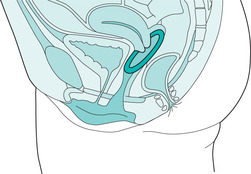Learning outcomes
By the end of this section, you should know how to:
▪ prepare the patient for this practice
▪ collect and prepare the equipment
▪ assist the qualified practitioner in the insertion of a ring.
Background knowledge required
Revision of the anatomy and physiology of vagina, cervix and uterus
Revision of ‘Infection prevention and control’ procedures (seep. 151)
Revision of local policy on vaginal ring pessary insertion.
Indications and rationale for the insertion of vaginal ring pessaries
Ring pessaries are made of a PVC type of material that is flexible and compressible by hand but springs back into shape when in situ (Fig. 47.1). The pessaries are supplied individually wrapped and sterile. There is a range of sizes; the patient should be measured and the most appropriate size fitted (Colpman & Welford 2004).
 |
| FIGURE 47.1Vaginal ring pessary in position |
Ring pessaries are used to relieve the symptoms caused by 1st, 2nd and 3rd degree uterine prolapse (James & Jenner 2002) when the patient:
▪ is unfit for a surgical repair of her prolapse
▪ does not wish to undergo surgery
▪ requires a temporary treatment to alleviate problems while awaiting surgery.
 Equipment
Equipment1. Selected pessary
2. Disposable gloves
3. Water-soluble lubricant
4. Protective pad
5. Receptacle for soiled disposable items
6. Warm water.
 Guidelines and rationale for this nursing practice
Guidelines and rationale for this nursing practice▪ explain the nursing practice to the patient to gain her consent and co-operation
▪ collect, check and prepare the equipment for efficiency of practice
▪ ensure maximum privacy for the patient and assist her into the position selected after she has agreed consent with the person inserting the pessary (see ‘Vaginal examination’, p. 363, for a list of appropriate positions)
▪ observe the patient throughout this activity to detect any signs of discomfort or distress
▪ put on the disposable gloves for protection
Stay updated, free articles. Join our Telegram channel

Full access? Get Clinical Tree


Get Clinical Tree app for offline access
